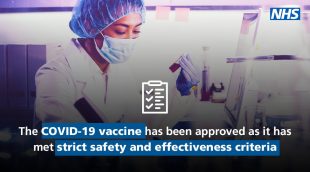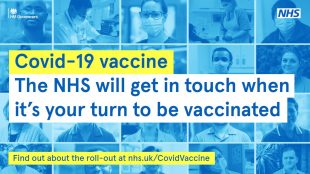On 8 December 2020, the first NHS patient in the UK received a COVID-19 vaccine. Since then, the Government has launched a mass vaccination programme. At the time of writing 6,853,3270 people have received their COVID-19 vaccination in the U.K.
COVID-19 vaccines are a key tool to help our way out of the pandemic, and vaccines are the best way to protect people from COVID-19. The vaccination programme currently taking place in the UK will save thousands of lives.

There are now two different vaccines being offered in the UK. The Pfizer Vaccine, and the Oxford-AstraZeneca vaccine. The Moderna vaccine has also been approved for use in the UK, with supplies expected to arrive in the Spring.
All three vaccines have been approved by the Medicines and Healthcare products Regulatory Agency (MHRA). They had to meet their strict standards of safety, quality and effectiveness.
When will I be vaccinated?
Vaccines are being allocated to people in the priority groups outlined by the Joint Committee on Vaccination and Immunisation (JCVI). The JCVI is made up of independent experts who advise the Government on which COVID-19 vaccines can be used in the UK, and the priority groups.
The prioritisation was carefully developed with the aim of preventing as many deaths as possible. It is estimated that vaccinating everyone in the priority groups would prevent around 99% of deaths from COVID-19. It is also essential that COVID-19 hospitalisations are reduced, so that the pressure on the NHS is relieved.
The guidelines for vaccination priority groups:
- Residents in a care home for older adults and staff working in care homes for older adults.
- All those 80 years of age and over and frontline health and social care workers.
- All those 75 years of age and over.
- All those 70 years of age and over and clinically extremely vulnerable individuals (not including pregnant women and those under 16 years of age, see the NHS advice for more information about who will not be vaccinated).
- All those 65 years of age and over.
- Adults aged 16 to 65 years in an at-risk group.
- All those 60 years of age and over.
- All those 55 years of age and over.
- All those 50 years of age and over.
Disabled people in the first four priority groups, which includes those who are clinically extremely vulnerable, will be included in this first wave of vaccinations. The Prime Minister has outlined that it is a realistic expectation that the first four priority groups should have received their vaccination by mid-February.
Some people might fit into more than one priority group. If this is the case, they will receive their vaccination in whichever priority group is highest. All high-risk groups are estimated to be over 25 million people.
Where will I receive my vaccine?
The Government has published a COVID-19 UK Vaccines Delivery Plan.
This involves expanding the vaccination programme with:
- 206 active hospital sites
- 50 vaccination centres
- Around 1,200 local vaccination sites – including primary care networks, community pharmacy sites and mobile teams
For a small number of highly rural areas, the vaccine will be delivered by mobile teams. There will be capacity to deliver 2 million vaccines every week.
You must wait to be contacted about receiving your COVID-19 vaccination. GP surgeries are sending out invitations every week. All vaccinations will be administered by the NHS, and are free of charge.
People who are housebound will also start to receive their vaccine in their home. These will be carried out by teams of district nurses, GPs and mobile vaccination units. Vaccines administered at home will still be allocated in line with the priority groups.
You can read patient information leaflets, or watch a film on general vaccinations for individuals with learning disabilities and some types of Autism Spectrum Conditions. Public Health for England has published vaccine guidance in easy read, as well as braille and British Sign Language.

Our way out of the pandemic
The COVID-19 vaccination delivery plan aims to save as many lives as possible, as quickly as possible. It is important that we all continue to stay at home to protect the NHS. This ambitious vaccine rollout plan will protect our more vulnerable groups first, and therefore save lives and reduce the pressure on the NHS.
Everyone is encouraged to attend their vaccination appointment when they receive their offer from the NHS. This is the best way to protect yourself, and others, from COVID-19.
How we are continuing to support disabled people
The role of the Disability Unit is to support and amplify the voices of disabled people across government. We are raising any questions or concerns disabled people have about vaccines in the heart of government. The Minister for Disabled People will continue working with disability stakeholders to ensure the accessibility of the vaccination programme and guidance.
The Minister for Disabled People has been working with the Department for Health on the vaccine rollout. The Minister has also organised for the Minister for COVID Vaccine Deployment to speak with stakeholders. This ensures that disabled people’s voices are being heard.
1 comment
Comment by Joanne Gibson posted on
My Niece is in receipt of DLA, has learning difficulties, physical problems and cannot live independently. She has not been given a vaccination appointment.